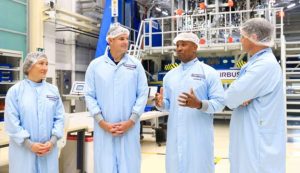Germany Signs Artemis Accords
Bremen, Germany – September 25, 2023 – The work underway in support of Artemis missions is an international effort and recently Germany has agreed to join the Artemis Accords, which is a non-binding agreement between the United States and partner nations, to help the effort to bring humans back to the Moon, to Mars and beyond.
The European Space Agency and Airbus, in coordination with NASA, hosted an Artemis II media event at the Airbus facility in Bremen, Germany, on Friday, Sept. 15. In this event, the whole crew of Artemis II was present at the facility where Airbus assembles the Orion European Service Module (ESM). The ESM will provide life support and propulsion for the crew to fly to the Moon and back for the upcoming Artemis II mission and beyond. The first ESM mission was the Artemis I mission last year.

The crew of Artemis II in the clean room in Bremen (Image Credit: Airbus Defense&Space)
Part of the event was an open session with Artemis II astronauts Reid Wiseman, Victor Glover, Christina Koch, and Jeremy Hansen. In the question-and-answer session with the media, the crew remarked that they were amused to learn that the European crew calls Orion the “Penthouse” that will sit on top of the ESM.
They also talked about their ongoing training, as, for example, Koch and Hansen recently performed some geology training in Canada as part of an evaluation of training activities for Artemis II and future lunar missions.
Artemis I was an uncrewed mission that launched from Kennedy Space Center on Nov. 16, 2022. Artemis orbited the Moon on a six day, 1.3-million-mile flight that gathered data and allowed for mission controllers to evaluate the spacecraft. It then returned to Earth safely and splashed down off the coast of Baja, California.
Following assembly of Artemis II components at a Thales facility in Italy, the ESM primary structure is transported to Airbus Bremen to be fully assembled and integrated into a working spacecraft module prior to shipment from Germany to its Florida launch site.
Source: NASASpaceFlight.com







